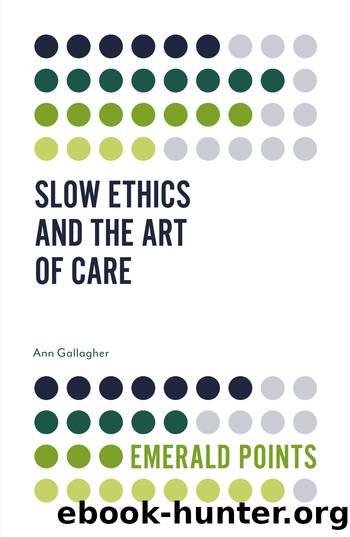Slow Ethics and the Art of Care by Gallagher Ann;

Author:Gallagher, Ann;
Language: eng
Format: epub
Publisher: Emerald Publishing Limited
Published: 2019-09-25T00:00:00+00:00
Quiet and Slow Ethics
An article in the Irish Times in 2017 entitled âCiúnas! The search for silence in the modern worldâ (Katie Byrne, 2017) reported that silence âis an increasingly sought-after commodityâ as âmulti-media landscape becomes even louderâ. The article details how the quest for silence (or âciúnasâ as is the Irish translation) is impacting on work and social life. There is, for example, the âQuiet Markâ on domestic appliances, increasing popularity of noise cancelling headphones and an increasing array of away days, mini-breaks and retreats that promise quiet and relief from our frenetic lifestyles and digital addictions.
An author who is comfortable with silence is Norwegian explorer, Erling Kagge. Kagge walked for 50 days across Antarctica alone and without a radio. Kagge begins his book Silence: In the Age of Noise, as follows:
Whenever I am unable to walk, climb or sail away from the world, I have learned to shut it out. Learning this took time. Only when I understood that I had a primal need for silence was I able to begin my search for it â and there, deep beneath a cacophony of traffic noise and thoughts, music and machinery, iPhones and snow ploughs, it lay in wait for me. Silence
(Kagge, 2018, p. 1)
Kagge goes on to share insights on topics such as wonder, inner peace, the value of âpauseâ and being âunborableâ. Of wonder in daily life, Kagge (2018, p. 9) writes:
It is one of the purest forms of joy that I can imagine. I enjoy the feeling. I often wonder. I do it almost everywhere: when travelling, reading, meeting people, when I sit down to write or whenever I feel my heart beat or see the sunrise. Wonder is one of the most powerful forces with which we are born. It is also one of our finest skills.
Kagge writes of the âlearning to value minuscule joysâ (p. 13) and of inner peace that comes with activities such as knitting, meditating, skiing, reading or brewing beer. He writes:
A great many of us have a desire to return to something basic, authentic, and to find peace, to experience a small quiet alternative to the din. There's something slow and sustainable about such pursuits, something meditative.
(p. 29)
We are reminded by Kagge that âdiscomfortâ with being alone and needing to turn to activities or gadgets to amuse ourselves to quell boredom is not a new phenomenon. He cites seventeenth-century philosopher, Pascal, who wrote that: âAll of humanity's problems stem from man's inability to sit quietly in a room aloneâ (p. 37). Silence, according to Kagge, is âabout rediscovering, through pausing, the things that bring us joyâ (p. 75).
Pausing to appreciate visual art, such as Munch's The Scream, can result in âa communicative silenceâ between the art and the viewer. Kagge describes âa good work of artâ as:
â¦like a thinking machine that reflects that artist's ideas, hopes, moods, failures and intuitions.
(p. 112)
Kagge's perspectives provide, perhaps, a balm for hectic days, a directive to take pleasure from small everyday events and to be able to bear silence that enables us to get to know ourselves better.
Download
This site does not store any files on its server. We only index and link to content provided by other sites. Please contact the content providers to delete copyright contents if any and email us, we'll remove relevant links or contents immediately.
Overcoming ADHD Without Medication : A Guidebook for Parents and Teachers by Children and Natural Psychology Association for Youth; Children The Association for Youth(732)
Out of the Mainstream: Helping the Children of Parents with a Mental Illness by Loshak Rosemary;(727)
Depression by Adams Media(547)
The Noom Mindset by Noom(514)
Delphi Collected Works of Sigmund Freud (Illustrated) by Sigmund Freud(479)
The Psychology of Media and Politics by George Comstock & Erica Scharrer(420)
MANIPULATION & MIND CONTROL: The Persuasion Collection: Dark Psychology Secrets, Analyze & Influence People with Nlp. How to learn Reading Friends and Develop Body Language Skills. by ROBERT TOWER(412)
Behold the Monster by Jillian Lauren(368)
It's nobody's fault: new hope and help for difficult children and their parents by Harold Koplewicz(366)
The 48 Laws of Mental Power: Overcoming Trauma and Building Mental Strength by Victor O. Carl(366)
Directions in Technical Writing and Communication by Gould Jay R.;(364)
The Hypnotic Coach: A Conversational Hypnotherapy Tool Kit by Marion Jess(354)
Positive Psychology Across the Lifespan; An Existential Perspective by Piers Worth(311)
Sigmund Freud by Janet Sayers;(310)
THE PSYCHOLOGY OF ENTREPRENEURSHIP; New Perspectives by Michael M. Gielnik; Melissa S. Cardon; Michael Frese(305)
Mastering Flow: Perform Better, Experience More Joy, and Live a Happier Life by Nils Salzgeber(302)
The Modern Young Man's Guide to Manhood by Wayne Walker(301)
Mind Hacking Secrets and Unlimited Memory Power: 2 Books in 1: Learn How to Improve Your Memory & Develop Fast, Clear Thinking in 2 Weeks + 42 Brain Training Techniques & Memory Improvement Exercises by Sharp Scott(297)
Secrets of the Autistic Millionaire: Everything I know about Autism, ASD, and Asperger's that I wish I'd known back then... by David William Plummer(286)
